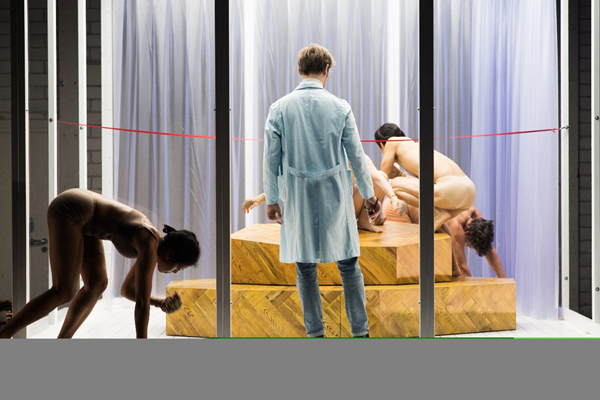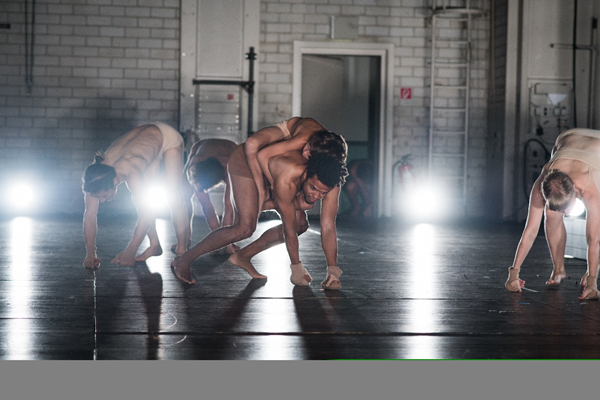|
《人类的屈辱》
Die Kränkungen der Menschheit
导演 安塔·海伦娜·雷克
Directed by Anta Helena Recke
慕尼黑室内剧院与柏林黑贝尔剧院、汉堡坎普纳格尔剧场和法兰克福牟松塔艺术家之家联合制作
Münchner Kammerspiele in co-production with HAU Hebbel am Ufer (Berlin), Kampnagel (Hamburg) and Künstlerhaus Mousonturm (Frankfurt)
世界首演:2019年9月26日
World premiere 26 September 2019
演出场地:慕尼黑室内剧院
WHERE: Münchner Kammerspiele
演出时长:1小时
Duration: 1 hour
德语演出,中文字幕
Performed in German, with Chinese subtitles
演出介绍 About Die Kränkungen der Menschheit
我们是否经常反思我们的感知机制,有没有想过我们观察和解读事物的方式或许能够揭示我们的观看习惯和思维烙印?在这个充满了大量冥想表演的作品中,安塔·海伦娜·雷克创造了一个三阶的舞台装置供人诠释,装置中,图像、声音和动作扮演着主要角色。此外,该剧关注到了对“人类”这个概念的反思,同时重新审视了戏剧作为观察艺术的可能。
《人类的屈辱》呈现了图像的循环,重叠连续的画面创造出了一个在博物馆、动物园和实验室之间的变化交错的混合空间:一群猴子在舞台上出现,最终聚集在一个穿着白大褂的陌生男人身边,它们每天都会被他喂食;几名游客在假想的某欧洲首都的博物馆中闲逛;一大群人在房间里画图。当关于世界的想法被其他想法取代,夜晚把我们带到这脆弱的时刻。这部作品的灵感来自于西格蒙德·弗洛伊德的“人类的屈辱”的概念,即人类优越性的丧失。该作品致力于讨论一个更加基本的问题:到底谁才是人类?“人类的屈辱” 展现了对表现、组织和理解的愿望。这部作品描述了一个被自己的过去取代的社会。

How often do we think about the mechanisms of our perception, about what the way that we look at and interpret things may say about our own viewing habits and imprints? In this almost contemplative production, Anta Helena Recke creates three staged experimental set-ups that are open to interpretation and where images, sounds and movements play the starring role. Among other issues, the show deals with a reflection on our own gaze and the notions that constitute humanity. And, not least, with rethinking the theatre as the art of looking.
The production “Die Kränkungen derMenschheit” creates a cycle of images. Pictures overlap one another in succession, creating a hybrid space among museum, zoo, and laboratory: a horde of monkeys populates the stage, ultimately gathering together around a strange man in a white lab coat to be fed as they do every day; a small museum group takes a wander through the museum of a fictitious European capital; a large group of people draws patterns in the room.The evening takes us to those fragile moments when one idea of the world is replaced by another. Inspired by Sigmund Freud’s notion of die “Kränkungen der Menschheit” or “humiliations to humankind” which deals with loss of humankind’s supremacy, the production devotes itself to the even more fundamental question, who is, in fact, humanity? “Humiliations to Humankind” is about the desire for showing, organizing, and understanding. It’s a piece about a society overtaken by its own past.
导演介绍 About Anta Helena Recke
安塔·海伦娜·雷克曾在希尔德斯海姆大学学习舞台艺术,在学习期间,她开展了多项跨学科表演以及音乐策划领域的项目。她的作品是表演形式的概念艺术,探索规范性的标记和非重复性,目的是为观众创造他们通常不会进入的体验空间。在多种领域,她以导演、戏剧家和其他的身份活跃。她的作品《中间王国》于2017年在慕尼黑室内剧院首演,并于2018年受邀参加柏林戏剧节。凭借《人类的屈辱》,她再次被邀请参加柏林戏剧节。《今日剧场》杂志的评论调查将她评为2018年年度新锐艺术家。此外,她还是国际戏剧协会(ITI)2019年的获奖者。

Anta Helena Recke studied Scenic Arts at the University of Hildesheim. During her studies, she developed several transdisciplinary performances as well as projects in the field of music-curating. Her works are concept art in the form of performances and explore the marking and non-repetition of normativity with the aim of creating spaces of experience for the audience that they would not normally enter. In various constellations, she works as a director, dramaturg and other functions. Recke’s production of “Mittelreich”, which premiered at Münchner Kammerspiele in 2017, was presented at the 2018 radikal jung festival and invited to the Berlin Theatertreffen in the same year. With “Die Kränkungen der Menschheit” she has once more been invited to the Berlin Theatertreffen. The critics’ survey of Theater heute named her Emerging Artist of the Year 2018. Furthermore, she is the 2019 award winner of the International Theatre Institute (ITI).
演职员表 Credits
概念&导演:安塔·海伦娜·雷克
概念&艺术合作:安娜·弗洛里歇尔,马克西·门亚·雷曼
舞台设计:卡洛·齐格弗里德
服装设计:波拉·卡杜姆
音乐:卢卡·莫特拉罗
灯光设计:约沙·埃克特
戏剧构作:瓦莱丽·戈林
研究:玛利亚·克里斯蒂安、基娅拉·加莱西
制作:奥拉夫·纳赫特维、约翰娜·J·托马斯
编舞、文字、表演:
阿丽亚娜·安德里根、让·柴泽、诺亚·唐克、亨利爵士、基南·赫米丹、马里奥·洛佩斯、拉拉·索菲·米拉格罗、本杰明·拉贾普尔、文森特·雷德茨基、乔安娜·提斯考、埃尔西·图内米尔、塞缪尔·伊塔·维埃拉·达席尔瓦·霍尔兹尔、山口隼人等

Cast:
Concept & Director: Anta Helena Recke
Concept & Artistic Collaborators: Anna Froelicher, Maxi Menja Lehmann
Stage Design: Carlo Siegfried
Costume Design: Pola Kardum
Music: Luca Mortellaro
Lighting Design: Joscha Eckert
Dramaturgy: Valerie Göhring
Research: Marja Christians, Chiara Galesi
Production: Olaf Nachtwey, Johanna J. Thomas
Choreography, Text, Performance:
Ariane Andereggen, Jean Chaize, Noah Donker, Sir Henry, Kinan Hmeidan, Mario Lopes, Lara-Sophie Milagro, Benjamin Radjaipour, Vincent Redetzki, Joana Tischkau, Else Tunemyr, Samuel Iatã Vieira da Silva Hölzl, Hayato Yamaguchi etc.
关于柏林戏剧节 About Berliner Theatertreffen
柏林戏剧节是德语区最盛大、最重要的戏剧节,与法国阿维尼翁戏剧节、英国爱丁堡艺术节并称为世界三大戏剧节。相比另两个戏剧节,柏林戏剧节更加着重戏剧内在结构的专业性与实验性,剧目外部意义的超前性与时代性。柏林戏剧节体现着当代社会的前进方向与戏剧的最高水平。2015年,吴氏策划与柏林艺术节签署了合作协议,于2016年至2020年连续5年在中国各地举办“柏林戏剧节”。
继2016年首次在中国成功举办后,2017年至2019年的柏林戏剧节在中国进一步扩大了活动的影响力,逐渐成为在中国戏剧界独树一帜的高质量品牌。2020年受全球新冠疫情影响,柏林戏剧节采用剧院线下放映的方式得以继续展开,同时在腾讯视频艺术频道上线。
All year round, Berliner Festspiele host a multitude of festivals, exhibitions and individual events in two houses – the Haus der Berliner Festspiele at Schaperstraße and the Gropius Bau near Potsdamer Platz – and other venues in the city. The combination and network of a festival house and an exhibition hall bears special potential for interdisciplinary project formats and the interaction of different forms of art. An annual programme includes the exhibitions and events at Gropius Bau, the festivals MaerzMusik – Festival for Time Issues, Theatertreffen, Musikfest Berlin and Jazzfest Berlin, the programme series Immersion as well as four National Contests for young people in the fields of theatre, dance, music and creative writing. In addition, there are education programmes, international guest performances, special events, venue rentals and conferences. Since Thomas Oberender was appointed director in 2012, Berliner Festspiele have been focusing on topics like performativity, alternative ways of artistic production and cross-genre approaches. Their formats provide both an overview and orientation, creating new connections between contemporary art, technological innovation and heterogeneous forms of work, discourse and experience.
评委会推荐语 Statement of the Jury
安塔·海伦娜·雷克在西格蒙德·弗洛伊德从前提出的“人类三大屈辱”外(1.人类起源于类人猿;2.太阳是宇宙的中心;3.人受制于潜意识),又增加了一项:欧洲白人终究不是人类的典范。导演通过对白人至上主义的批评,启发观众反思自己的视角以及对表演的层层解读。在舞台上的一间美术馆里,一幅画的场景被重现,一群游客则讨论着另一幅画。这部以冥想式表演为主的作品,呈现了对由常规观察标准引发而形成的接收反馈机制的极致审视。雷克讨论了一些后殖民主义议题,从恢复公民权到白人范式思考,运用了存在与留白这一不同寻常但掷地有声的手法。
Anta Helena Recke adds another “Humiliation of Mankind” to the three previously noted by Sigmund Freud (1. Mankind descends from the apes; 2. The sun is the centre of the universe; 3. People are at the mercy of their unconscious mind): White European men are not the paragons of mankind after all. With her criticism of White Supremacy, the director prompts her audience to reflect on their own views and associated patterns of decoding. In the setting of an art museum, a painting is re-enacted and a different picture is discussed among a group of visitors. This largely meditative performance presents a sublime scrutiny of viewing norms and thereby patterns of reception and representation. Recke touches on several post-colonial discourses–from restitution to white normative thinking, applying unusual energetic devices of presence and absence.
评论 Reviews
“《人类的屈辱》分为三个部分将殖民过去的历史、当前时代的殖民性和非殖民化愿景搬上舞台。它找到了一种戏剧语言,以某种方式将奥德丽·洛德所提出的“大师的工具”(“Master’s tool”)抛在了后面。”
——阿扎德·沙里菲,戏剧学研究学者,慕尼黑大学
“这位年轻的德国-塞内加尔导演的室内制作是一部关于凝视的主观力量的沉思而神秘的论文。在一小时中,作品涵盖了多样的话题,从弗洛伊德到德国浪漫主义绘画,再到后殖民理论,提出了关于观察和被观察的问题。”
——A.J.戈德曼,纽约时报
“Die Kränkungen der Menschheit stages in its three parts a history of the colonial past, the coloniality of the current and a decolonial vision. It finds a theatrical language that somehow leaves the “Master’s tool” as Audre Lorde has suggested it, behind.”
- Azadeh Sharifi, theatre scholar, researcher, and lecturer, Ludwig-Maximilians-University Munich
“The young German-Senegalese director’s chamber production is a meditative and mysterious treatise on the subjective power of the gaze. The points of contact range from Freud to German Romantic painting to postcolonial theory over a sparse, hourlong production that asks questions about observing and being observed.”
- A.J. Goldmann, The New York Times
剧院介绍 About Münchner Kammerspiele
慕尼黑室内剧院是德语戏剧大环境中最重要的戏剧舞台之一。从20世纪20年代开始,尤其是在寻求与现代的对话和对抗层面,剧院已经形成了一个强大体系。诸多知名剧目都曾在该剧院首演,其中包括瑞士德语剧作家弗里德里希•迪伦马特、德国表现主义戏剧先驱弗兰克•魏德金和著名德国戏剧家与诗人贝尔托•布莱希特的作品。慕尼黑室内剧院是一个聚焦社会政治,具有美学创新、当代视野和国际化的市政剧院,剧院多次被邀请到德国和国际著名艺术节展演。
The Münchner Kammerspiele are among the most important stages in the German-speaking context. Since its beginnings in the 1920ies, the theatre has been shaped by a strong ensemble, which particularly seeks the dialogue and confrontation with the present. Having presented numerous world premieres, including works by Friedrich Dürrenmatt, Frank Wedekind and Bertolt Brecht, the theatre conceives itself as an aesthetically innovative, contemporary, and cosmopolitan municipal theatre with a socio-political focus. They have been invited to numerous festivals both in Germany as well as abroad. |

